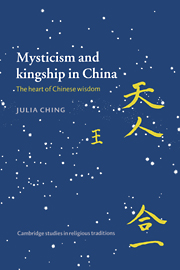Book contents
- Frontmatter
- Contents
- Preface
- 1 Son of Heaven: shamanic kingship
- 2 Son of Heaven: kingship as cosmic paradigm
- 3 The moral teacher as sage: philosophy appropriates the paradigm
- 4 The metaphysician as sage: philosophy again appropriates the paradigm
- 5 The paradigm enshrined: the authority of classics
- 6 The mystic as sage: religion appropriates the paradigm
- 7 The sage-king as messiah: religion again appropriates the paradigm
- 8 All under Heaven: political power and the periphery
- A glossary of Sino-Japanese names and terms
- Bibliography
- Index
1 - Son of Heaven: shamanic kingship
Published online by Cambridge University Press: 15 December 2009
- Frontmatter
- Contents
- Preface
- 1 Son of Heaven: shamanic kingship
- 2 Son of Heaven: kingship as cosmic paradigm
- 3 The moral teacher as sage: philosophy appropriates the paradigm
- 4 The metaphysician as sage: philosophy again appropriates the paradigm
- 5 The paradigm enshrined: the authority of classics
- 6 The mystic as sage: religion appropriates the paradigm
- 7 The sage-king as messiah: religion again appropriates the paradigm
- 8 All under Heaven: political power and the periphery
- A glossary of Sino-Japanese names and terms
- Bibliography
- Index
Summary
INTRODUCTION
The earliest known religion is a belief in the divinity of kings … [In] the earliest records known, man appears to us worshipping gods and their earthly representatives, namely kings.
Perhaps there never were any gods without kings, or kings without gods. When we have discovered the origin of divine kingship we shall know. But at present we only know that when history begins there are kings, the representatives of gods.
In his well-known book, Arthur M. Hocart speaks of kingship as a gift of the gods, which is often inherited through a special lineage. Thus, the new king's accession to the throne, on the death of his predecessor, signifies continuity and stability, through a kind of religious logic that is tantamount to a deification of the deceased king, and, by extension, of his heir. This is also symbolised by the passing on of the royal regalia, whether these be the crown, sceptre, sword, seal or anything else. And then, frequently, sacrificial offerings accompany or follow the accession, serving as the sources of royal power.
The sacred character of kingship in China is little studied, when compared to the subject of kingship, or the emperor system, in Japan or Egypt, where the divine character of the royal person – whatever that means – has been highlighted. Especially during World War II, the Japanese emperor was known to be considered by his subjects as ‘divine’, even a ‘god’ (kami), and much has since been written on the subject.
- Type
- Chapter
- Information
- Mysticism and Kingship in ChinaThe Heart of Chinese Wisdom, pp. 1 - 34Publisher: Cambridge University PressPrint publication year: 1997



